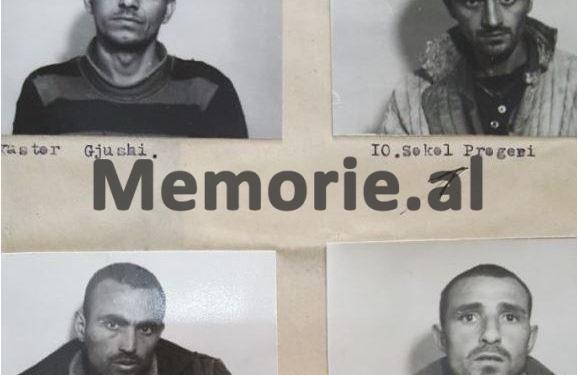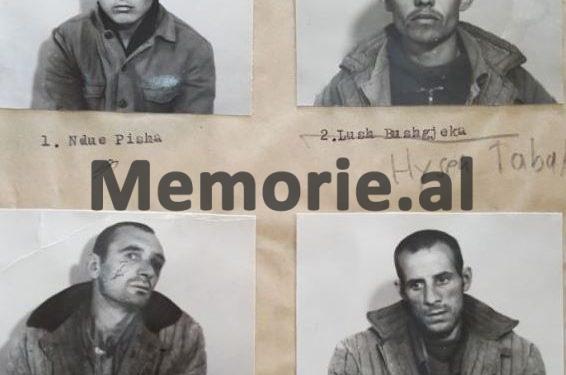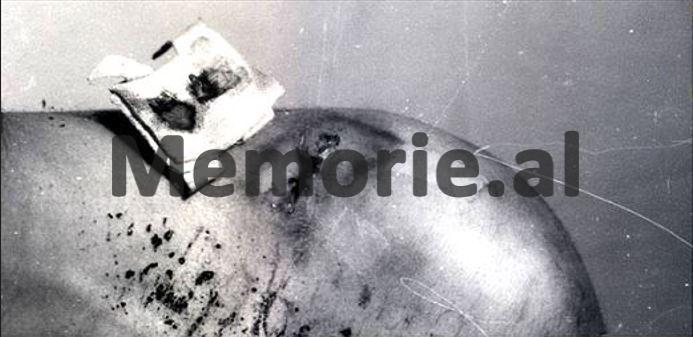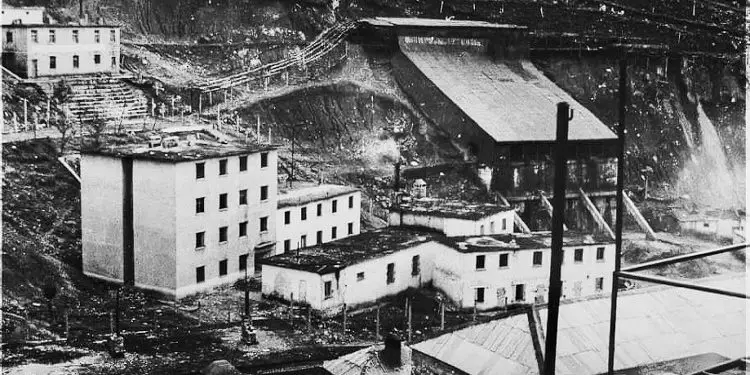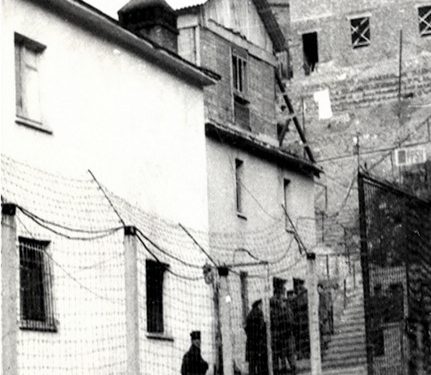By Dashnor Kaloçi
The first part
Memorie.al / The event of May 22, 1984, otherwise known as; The “Qafë Bari Revolt”, which happened exactly 40 years ago, contains a voluminous file located in the Archive of the Ministry of the Interior, from where a number of documents have been made public in the media from time to time, which shed light on that revolt, and which it should be noted that at that time shocked the communist regime of Tirana quite a bit. This and due to the fact that, just five days after that revolt of the political convicts who were serving heavy sentences in that forced labor camp with the most difficult conditions, on May 27, 1984, the command of ‘Department 311’ of Qafë – Bari , made an analysis of the event, listing chronologically everything that had happened there (with the names of the convicts and the police officers and the management staff of that camp), as well as the reasons that led to that event and the measures taken with the relevant tasks, which will to be implemented by the troops and command of that department, in the future.
This thing, that is, in the documents with the analysis of that event which is in the file in question, what stands out and we think is of some interest to researchers and historians who may one day deal with the “Qafë-Bari Revolt”, or even for the general public, (when the topic of the crimes of communism in these last ten years, continues to remain one of the most discussed), is the way they distorted and deformed the event in question, in their report-information. Among other things, this is also noted in that part of the document, where in the relevant analysis of the Command of the 311th Department of Qafë-Bari, among other things, it is said: “After that, the names were read, where the first was Kostandin Gjordeni, who just he came out, hit the wall with his head and screamed loudly and as if he was allegedly hit”.
As above, this thing changes, not only with the public testimonies of Kostandin Gjordeni himself, (such as for the documentary “Bloody Revolt of the Qafë Bari”, realized by D. Kaloçi and M. Stafa, produced by Radio-Television Albanian public, in cooperation with the office of the OSCE Presence in Tirana and the German embassy, originally broadcast in 2018), but also many of the other former fellow sufferers of that camp (such as: Dine Fratari, Dalip Zhaboli, Haxhi Baxinovksi, Bajram Vuthi, Agron Hoxha, Pjetër Luli, Lek Frroku, Bedri Blloshmi, etc.), who in their memoirs with writings and books, as well as public pronouncements, give completely different versions than what is said in the secret document, with the analysis of the Command of the Department 312 Qafë Barit, related to the event in question.
Following this dossier, in addition to the aforementioned documents, we will also publish a part of the testimony we received from Kostandin Gjordeni, regarding the event of the Qafe Bari Revolt and his wounding, where he accuses an officer, and not the soldiers of the guard No. 1, as stated in the secret document, with the analysis of the command of that department.
THE SECRET DOCUMENT WITH THE ANALYSIS MADE BY THE COMMAND OF DEPARTMENT 311 NEAR BAR, ON THE EVENT OF THE REVOLT OF THE PRISONERS OF THAT CAMP, ON MAY 22, 1984
SOCIALIST PEOPLE’S REPUBLIC OF ALBANIA
MINISTRY OF INTERIOR AFFAIRS Example No.
COMMAND OF REP.311
Qafë Bari on 27 V.1984
ANALYSIS
On the event that happened on 22.5.1984 in the convict regime of Ward 311, in Qafë Bari.
On 22.5.1984, from 7:30 a.m., when the third shift returned from work, the labor guard announced that the convict Ndue Martin Pisha, aged 19, sentenced to 23 years of imprisonment for diversion, in February 1984 and Ndrek Geg Nikolla, from the district of Lezha, aged 35, sentenced to 16 years of imprisonment, for treason against the country, in 1976, have not fulfilled the work norm.
The ward command, having recently had a problem with the non-fulfillment of the norm by some special individuals, ordered the labor guard that these two convicts, after eating bread, go for 2 hours and work with the first shift, for make the daily rate.
The guard officer and the work guard, when they got ready for the first shift to work, called the two convicts, who were going to go back to work, who initially agreed.
Later, these two convicts were caught by the convicts Sokol Sokoli and Sokol Progri, both from Tropoja, and told them that they would refuse to go to work, otherwise; you have no place in this guild. Due to this pressure, the two convicts, especially Ndue Martin Pisha, refuse to comply with the order.
At this moment, the labor guards, the policemen Fiqëri Çakalli and Islam Dega, called Ndue Pisha to the offices of the re-education council and told him that he had to go to work, or else he would go to the isolation room, but Nduja did both of these refused them and in the meantime, the convict Tom Ndoja goes to the two policemen who called Ndue and takes the convict Ndue Pisha from the hands of the two policemen, telling them that; you have nothing to do with this and they both leave.
The policemen immediately act to arrest them, but when they go out, they see that together with these two convicts, the convicts, Sokol Sokoli and Sokol Progri, have joined and opposed the policemen, having bricks in their hands, to shoot them. .
In such conditions of mass opposition, the police immediately notify the guard officer and the latter, after taking full measures to strengthen the external security of the ward, together with a group of 5 people and the police platoon commander, equipped with rubber sticks, entered the regime of the convicts and called on the convicts Ndue Pisha and Ndrek Nikolli to carry out their order, but they refused.
Then the group of policemen forcibly intervened, to catch them and take them to the isolation room, but in the meantime, 12-13 convicts, such as: Sokol Sokoli, Sokol Progri, Tom Ndoja, Martin Leka, Ded Nimani, Bajram Vuthaj, Ndue Kola, Haxhi Baxhinovski, Lush Bushgjoka and Kostandin Gjordeni, equipped with bricks and stones in their hands, in a position of dominance over the group of policemen, put pressure on them to let them go.
Facing a massive and organized opposition, the guard officer decided to cancel this order and take other measures to stabilize the situation.
After that, the commander of the police platoon ordered all the convicts to gather and enter the canteen to make the appeal, an order that was followed by everyone immediately.
About this created situation, the Head of the Branch and the Commander of the Department, who had gone on duty in Fushë-Arrëz, were immediately notified.
After they put the convicts in the canteen, it was thought that by making the appeal one by one, when the convicts came out, those who objected would be caught and put in the isolation rooms.
During the appeal, when it was the turn of the convict Kostandin Gjordeni to go out, he demonstratively refused, so the convict Sokol Sokoli also refused to come out himself, who took his whole group with him and went out by force, breaking the siege of the policemen, from this mess it was achieved that the appeal was not held and that all the convicts who were in the hall, about 350 people, got out.
When they came out, a differentiation was made among the convicts, those who did not mix with the event, went to their premises and rooms, while 20-24 convicts, gathered in the square on the dormitories, pelted them with stones and bricks and the iron levers, which they took from a building that is being built, the shovels and baromines inserted and hidden in the internal regime and with them, they were threatening and pressuring the group of policemen not to approach, that blood will be spilled and from time to time, they threw stones and bricks at the policemen.
The police officer called several times to follow their orders and go to the isolation rooms, but these convicts asked for concessions and compromises, so that no disciplinary measures were taken against them, which the police officer refused. Categorically.
After the situation in these conditions, when the convicts were differentiated, the cadres who were there decided that again, all the convicts should enter the canteen to make the appeal, which was not done before/
The convicts generally obeyed the order, while those who had disobeyed the police orders, at first hesitated, but then put down the tools they were holding and entered the canteen, all standing together, at the end of the hall.
At this moment, the Head of the Branch and the Commander of the Department come to the hall, who, after consulting with the cadres who were there, entered about 20 cadres and policemen, led by the commander of the department, and after taking measures outside and inside, to “caught and tied up the participants of this objection, during the second appeal.
For the purpose of isolation, they call on all the convicts who would hear the name, to get out and the others not to move from the place, the commander of the department called on the Council of Reeducation, to approach the head of the hall and help the officer of police, to establish order.
After that, the names were read, where the first was Kostandin Gjordeni, who just came out, hit the wall with his head and screamed loudly, as if he was allegedly hit.
Meanwhile, his group that was inside the canteen, went and started shouting and trying to help them, when the officer did not allow them, they started pushing and taking and breaking the canteen benches and some crutches they had some convicts and a fight started between the police and the group of convicts, while the Council of Re-education, headed by Dalip Zhabolli, did not support or help the officer at all!
In these circumstances, the commander of the ward and the order to withdraw the police officer who was fighting with the convicts, and thus the whole group of convicts went out and went up to the square on the dormitories, about 24 convicts, who took back only the bricks and stones, and some irons that they had hidden in the ground, behind the laundry.
In the same way, 2-3 of them also took out the knives that were seen to be taken out from the walls of the building under construction, which they had hidden and prepared before.
At these moments, the two members of the police force that were escorting the convict Kostandin Gjordeni to the isolation rooms and another part prevented the police officers, who were going to help the policemen who were escorting the convict to the cells of isolation, as they were in danger of being attacked by the convicts.
Seeing this situation, the commander of the department ordered that Kostandin Gjordeni be released from the isolation rooms and the officer be withdrawn gradually, protecting himself from the blows of the convicts with stones and bricks, so that they are not harmed.
At this time, the political instructor who went to help the policemen of the isolation rooms was caught by 3-4 convicts, one of them, Haxhi Baxhinovski, was slightly wounded with a knife in the stomach.
Similarly, when the officer was withdrawn to go to the gate of the infirmary, according to the order of the command, since in this situation the officer was too revolted and unrestrained, if the convicts were in a dominant position, they could harm the officer, three convicts, as they were; Martin Leka, Kostandin Gjordeni and Tom Ndoja, followed the officer with stones, to the exit gate, then the Head of the Branch, ordered that guard No. 1, to use the weapon, against these three convicts, to prevent their attack with stones and bricks, an order which the tower immediately carried out, slightly injuring the convict Kostandin Gjordeni in the arm.
In the same way, all the external security positions of the ward fired with one volley in the air. This measure, taken by the Head of the Branch, panicked all the convicts who immediately gathered in the square and lined up on the bunks, demanding to be handed over to the Internal Affairs Branch.
The Head of the Branch and the command of the department took measures so that the convicts returning from the labor front would not enter the regime without stabilizing the situation, taking measures to secure them in the gallery as well.
In these situations, we received the notification that the Deputy Minister of Internal Affairs and the Director of the Directorate of Enforcement of Criminal Decisions had left for our ward, and from our side, no further actions were taken against the convicts, who remained in the regime and did not commit some concrete action. Memorie.al
next issue follows




